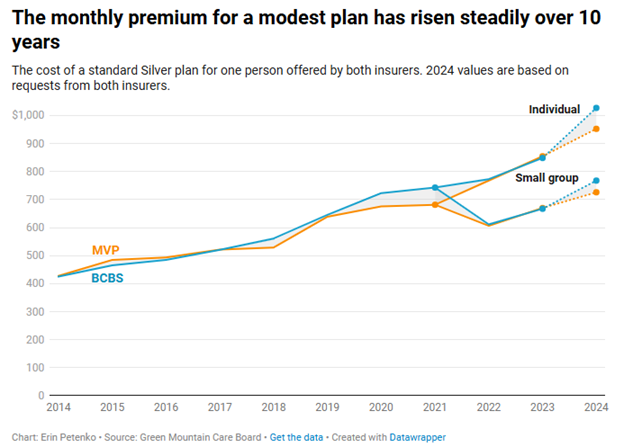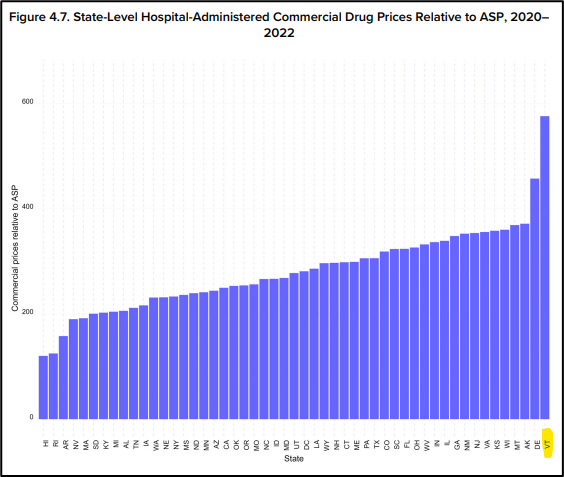June 30, 2025
New healthcare cost controls signed into law.
Having completed the necessary work of completing a state budget and setting the statewide education property tax yield for 2026, the Vermont General Assembly wrapped up its 2025 Legislative Session at the end of May.
In part IV of the 2025 Vermont Legislative Recap, we look at efforts to reduce healthcare costs that were approved by lawmakers and Gov. Scott.
NFIB VT encourages lawmakers to think outside on the box on healthcare reform and prioritize relief for Main Street.
Unmerged Health Insurance Market (Signed Into Law). One of the first bills signed into law this year, H.35 (Act 2, Rep. Lori Houghton) keeps the individual and small group health insurance markets separate rather than reverting back into a single pool. This is good news for small business owners who offer employee insurance through the small group market.
In 2014, as part of implementing the Affordable Care Act (ACA), Vermont became one of the first states to merge its individual and small group markets. The small group market has traditionally had a more stable risk profile than the individual market.
Merging the two markets essentially forced small businesses to subsidize the individual market, accelerating premium growth in the small group market while only slightly reducing growth for non-group individuals.

Chart from VTDigger, 8/3/2023.
The markets were unmerged in 2022, following the enactment of enhanced subsidies for individual market enrollees at the federal level. At the time, Blue Cross Blue Shield VT outlined how unmerging the markets would reduce costs by more than $20 million for small businesses in the small group market.
Unmerging the markets allowed individual market enrollees to take advantage of higher federal subsidies while ending the cross-subsidization of individuals by small businesses. Small group premiums declined and have remained below individual premiums despite rate increases in both markets.
Reference-Based Pricing (Signed Into Law). In response to the endless increases in the cost of health insurance and health care, Vermont lawmakers directed the Green Mountain Care Board (GMCB) to adopt referenced-based pricing (RBP) for hospital services.
RBP establishes a maximum price that a hospital can charge for a health care service. The GMCB will set the maximum as a percentage of the price paid by Medicare for the same hospital service and is also permitted to adopt RBP for health care services delivered in non-hospital settings. RBP is set to take effect in 2027.
The law prohibits health care providers from balance billing patients for any amount above the RBP price.
Hospitals generally charge much higher prices to commercial payers (individuals, businesses) with private insurance to offset lower prices paid by Medicare and Medicaid for the same services. This is a hidden subsidy from individuals and small businesses to government healthcare programs.
RBP has the potential to reduce insurance premiums for small employers by avoiding lengthy and contentious negotiations over the prices of hospital services. It also could have a positive impact on property taxes, as escalating insurance premiums have been a major factor in local government and school budgets.
Hospitals argue that they’ll have to shift costs elsewhere or cut back on services if RBP maximums are set too low.
Referenced-based pricing was proposed in S.55 (Sen. Ruth Hardy) and included in a larger healthcare reform bill (S.126).
Specialty Drug Price Limits (Signed Into Law). According to a December 2024 report by RAND, Vermont hospitals charge commercial insurers the largest markup on clinician-administered drugs in the country. These are among the most expensive prescription drugs, are rapidly growing in utilization, and used treat serious conditions like cancer, autoimmune disease, and chronic inflammation.
Nationally, the markup paid by commercial insurers for clinician-administered drugs compared to the average sales price for the same drug is 281%. The markup in Vermont is over 500% of average sales price.

Under H.266 (Rep. Alyssa Black), the markup for these drugs will be capped at 120% of average sales price starting on January 1, 2026.
Blue Cross Blue Shield of VT has been losing money for several years and regulators are concerned their financial collapse could devastate healthcare delivery in Vermont. BCBS VT estimates this change alone will reduce their eye-popping premium increase requests for 2026 in the individual and small group markets by 4%.
Hospitals worry the lost revenue will force them to reduce services or push them closer to the financial brink. Regional hospitals project this will cost them between $2 million and $16 million per year. UVM Medical Network, including UVM Medical Center, believes its loss will be $60 million to $80 million annually.
NFIB is a member-driven organization advocating on behalf of small and independent businesses nationwide.
Related Articles














